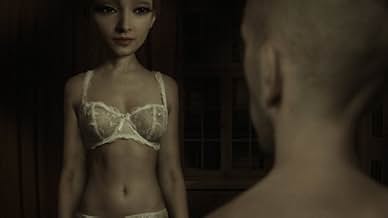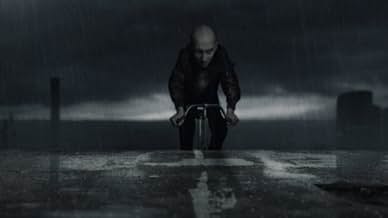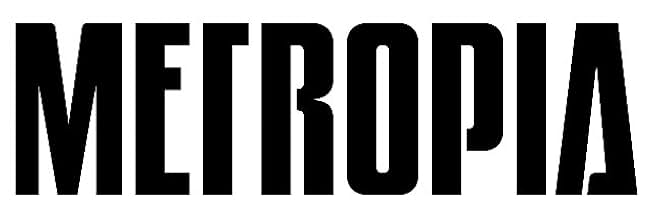IMDb RATING
6.2/10
8.3K
YOUR RATING
A complex story of a misaligned man, though good intent, creating a nightmarish Dystopian existence.A complex story of a misaligned man, though good intent, creating a nightmarish Dystopian existence.A complex story of a misaligned man, though good intent, creating a nightmarish Dystopian existence.
- Awards
- 3 wins & 6 nominations total
Vincent Gallo
- Roger Olofsson
- (voice)
Juliette Lewis
- Nina
- (voice)
Alexander Skarsgård
- Stefan
- (voice)
Sofia Helin
- Anna Svensson
- (voice)
Shanti Roney
- Karl
- (voice)
Fares Fares
- Firaz
- (voice)
Fredrik Eddari
- Mehmet
- (voice)
Indy Neidell
- Wayne Marshal
- (voice)
Joanna Mikolajczyk Winterø
- The Metro
- (voice)
- (as Joanna Zofia Bard Mikolajczyk)
Magnus Skogsberg
- Roger's Boss
- (voice)
- (as Magnus Skogsberg Tear)
Lotta Bromé
- News Anchor
- (voice)
Sandy Mansson
- Office Gossip
- (voice)
Featured reviews
can't quite understand the negative reviews on this movie. yes, the animation isn't 'high tone' but the story line will keep you glued to the movie.
the other more positive reviewers have finely analyzed and explained this short movie so i will not repeat their efforts. but i do suggest to give this most unusual film a look.
there are some weak spots in the story but as a whole it all works! it's different in look and atmosphere and isn't that what movie buffs seek out.
please don't approach this little gem of a movie expecting a wow wee in special effects. that's not what it's about. i believe the director is making a subtle comment on our times.
the other more positive reviewers have finely analyzed and explained this short movie so i will not repeat their efforts. but i do suggest to give this most unusual film a look.
there are some weak spots in the story but as a whole it all works! it's different in look and atmosphere and isn't that what movie buffs seek out.
please don't approach this little gem of a movie expecting a wow wee in special effects. that's not what it's about. i believe the director is making a subtle comment on our times.
it could be a dark utopia. or only reflection of present. in fact, it is a portrait. for fears, searches, self definitions, paranoia, secrets, conspiracies and perception of life as a long and gray chain of day by day. in same measure, it is a kind of explanation. for hidden realities, for dreams and expectations, for the status of people as tools, for the reasons escaping to the predictability, so, a reflection support. one far to be bad because animation is always inspired form for remind basic truths.
So first of all: In general I am a big fan of low-budget and small films. I think thats where the real passion is.
And Metroia really was a one-man-thing. At least that what I took from it. So there is a pretty impressive achievement here. No doubt. I respect that. I like that.
So it kinda hurts me that I have to say that Metropia would have been a better short film then a feature. It sometimes just dragged. And not in a moody or artistic way (dont worry, I am all in for Tarkovsky and Co) but just with spans of scenes that are not interesting. You can argue that a certain kind of monotony helps you understand the character better. I guess thats correct. But there was still a little underwhelming taste in the end.
And Metroia really was a one-man-thing. At least that what I took from it. So there is a pretty impressive achievement here. No doubt. I respect that. I like that.
So it kinda hurts me that I have to say that Metropia would have been a better short film then a feature. It sometimes just dragged. And not in a moody or artistic way (dont worry, I am all in for Tarkovsky and Co) but just with spans of scenes that are not interesting. You can argue that a certain kind of monotony helps you understand the character better. I guess thats correct. But there was still a little underwhelming taste in the end.
One gets accustomed to certain styles of animation, not to mention certain themes. It's either for kids or adults, and it's either 2D or 3D. Of course there are exceptions but for the sake of simplicity, this Manichean duality dominates the market. It's rare that a film emerges that challenges these notions but Tarik Saleh's Metropia does that in fairly interesting ways. The style is an bit of a mash-up between 2 and 3 D - the frames are digitally composited from head shots that have been stretched and squashed then placed on smallish bodies creating creepy caricatures of the actors being photographed. The effect, visually, is of the puppetry in a Thunderbirds (or Supercar) episode as designed by Drew Friedman, with a heavy dose of dark Gilliam"esquire." despair. The animation is stiff, stylized and intentionally rough and jerky. Metropia is not super deep at it core, but it reminds me of the Heavy Metal comics I used to devour when I was a teenager, and that's not at all bad.
It's 2024, the world is running out of oil, and Europe has been connected via a huge subway system. The skies are always gray and it rains all the time. Roger, our protagonist, a bald, hydrocephalic, stoop-shouldered everyman, is afraid to take the metro because he has been hearing voices. He lives with his girlfriend who seems to always be on another planet. One morning, Roger is forced to take the metro because his bike (which he was using illegally anyway) has been destroyed. Sure enough, he begins to hear voices, a voice that has been seeping into his life away from the Metro, on top of everything. On that fateful subway ride, he sees Nina, the spitting image of the girl on his shampoo bottle - a shampoo called Dangst, if that gives any clue as to the relative depth of the film in question. On impulse - despite the urging of the voice in his head - Roger follows Nina, and discovers the world, not far beneath the surface, is not quite what it seems.
As I mentioned, the concepts are pretty thin. The requisite global corporate conspiracy, the rampant consumerism in a dysfunctional dystopia, and the soul-dead protagonist in a souls dead world, are requisite tropes for a film like this. Of course, They have been executed more competently, and in more depth, elsewhere, but the strength of Metropia is its visuals. It is animated for a reason. To that end, the spare, creepy animation style suits the film perfectly. By now, whiz-bang 3D animations are the norm, the rule, so it's at first disconcerting to see animation used so sparingly, minimally and strangely. But this is the point. The world has had all the life and energy sucked out of it, it's no wonder there's not much energy left for the inhabitants of said world. The familiar grey palette allows for even the most subdued tan coat and blonde hair of Nina's to stand out. This lack of movement is also a symbol of conformity. Literally, don't stand out.
Despite its familiar themes, Metropia is worth screening for the simple marriage of form and function it represents. It's a brave filmmaker, who, in this age of Avatar, chooses to make a quiet, simple, creepy film. Saleh, gives us a film, not breathtaking in it's scope, or necessarily ground breaking (except for what it doesn't strive to achieve: mindless spectacle) but calm, understated and worthy, for serious fans of animation, and the brand of sci if familiar to fans of Heavy Metal (the magazine, not the movie).
It's 2024, the world is running out of oil, and Europe has been connected via a huge subway system. The skies are always gray and it rains all the time. Roger, our protagonist, a bald, hydrocephalic, stoop-shouldered everyman, is afraid to take the metro because he has been hearing voices. He lives with his girlfriend who seems to always be on another planet. One morning, Roger is forced to take the metro because his bike (which he was using illegally anyway) has been destroyed. Sure enough, he begins to hear voices, a voice that has been seeping into his life away from the Metro, on top of everything. On that fateful subway ride, he sees Nina, the spitting image of the girl on his shampoo bottle - a shampoo called Dangst, if that gives any clue as to the relative depth of the film in question. On impulse - despite the urging of the voice in his head - Roger follows Nina, and discovers the world, not far beneath the surface, is not quite what it seems.
As I mentioned, the concepts are pretty thin. The requisite global corporate conspiracy, the rampant consumerism in a dysfunctional dystopia, and the soul-dead protagonist in a souls dead world, are requisite tropes for a film like this. Of course, They have been executed more competently, and in more depth, elsewhere, but the strength of Metropia is its visuals. It is animated for a reason. To that end, the spare, creepy animation style suits the film perfectly. By now, whiz-bang 3D animations are the norm, the rule, so it's at first disconcerting to see animation used so sparingly, minimally and strangely. But this is the point. The world has had all the life and energy sucked out of it, it's no wonder there's not much energy left for the inhabitants of said world. The familiar grey palette allows for even the most subdued tan coat and blonde hair of Nina's to stand out. This lack of movement is also a symbol of conformity. Literally, don't stand out.
Despite its familiar themes, Metropia is worth screening for the simple marriage of form and function it represents. It's a brave filmmaker, who, in this age of Avatar, chooses to make a quiet, simple, creepy film. Saleh, gives us a film, not breathtaking in it's scope, or necessarily ground breaking (except for what it doesn't strive to achieve: mindless spectacle) but calm, understated and worthy, for serious fans of animation, and the brand of sci if familiar to fans of Heavy Metal (the magazine, not the movie).
It's a story somewhere in the lines of 1984. Dystopian is a genre in itself and it's part of the New World Order conspiracy which has been the theme of many cinema and literature since the 50ies. So yes the core of the story is an old one and all has to come from the graphics, characters and small storyline differences.
In that aspect it's not a masterpiece but it is surely nothing to sneeze at. The animation is very okay. The characters are very average human beings which makes them easy to relate to and likable. The fact that the story is not completely new is not disturbing. Very much worth watching.
In that aspect it's not a masterpiece but it is surely nothing to sneeze at. The animation is very okay. The characters are very average human beings which makes them easy to relate to and likable. The fact that the story is not completely new is not disturbing. Very much worth watching.
Did you know
- TriviaAnna wears a T-shirt that says "Maybe he hasn't called because he's washing his hair".
- GoofsWhen Anna is doodling on the mail, it is clearly seen that the debt collection agency has spelled its business as "dept collection".
- ConnectionsReferenced in Stockholms 20th International Film Festival (2009)
- How long is Metropia?Powered by Alexa
Details
Box office
- Budget
- SEK 32,000,000 (estimated)
- Gross worldwide
- $81,305
- Runtime
- 1h 26m(86 min)
- Color
- Sound mix
- Aspect ratio
- 1.85 : 1
Contribute to this page
Suggest an edit or add missing content


















